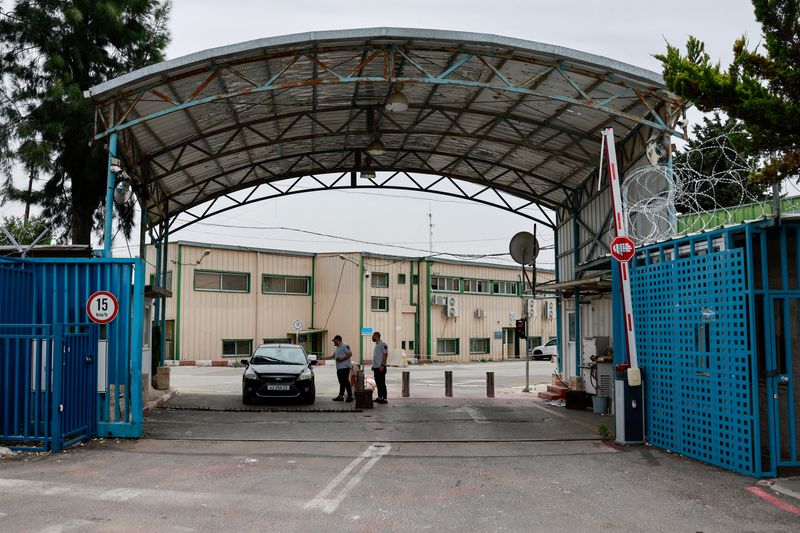By Michelle Nichols
UNITED NATIONS (Reuters) - Israel's parliament has banned the United Nations Palestinian refugee agency UNRWA from operating in the country, effective in 90 days.
The ban has sparked international condemnation and raised questions about the legality of Israel's decision.
Here is key information about the move:
WHAT IS UNRWA?
The U.N. General Assembly created the agency in 1949 to help Palestinian refugees following a war surrounding the founding of Israel, when 700,000 Palestinians were displaced.
UNRWA has been active for decades in the Gaza Strip and for the past year has sought to aid civilians caught up in Israel's war against Hamas militants in the enclave, where many of the 2.3 million people are suffering from a lack of shelter, food and medical care.
WHAT HAS THE UNITED NATIONS SAID?
U.N. Secretary-General Antonio Guterres has said Israel's ban on UNRWA, if implemented, would violate international law, the founding U.N. Charter and a U.N. convention adopted in 1946.
In a letter to Israel's Prime Minister Benjamin Netanyahu on Tuesday, Guterres called for UNRWA operations to continue and said Israel cannot use the national law barring UNRWA as "justification for its failure to perform its obligations under international law."
WHAT ARE ISRAEL'S OBLIGATIONS?
The U.N. views Gaza as Israeli-occupied territory, and international law requires an occupying power to agree to relief programs for people in need and to facilitate them "by all the means at its disposal."
In his letter, Guterres also wrote that article two of the founding U.N. Charter requires that Israel "shall give the United Nations every assistance" in its work.
He cited as another legal issue the Convention on the Privileges and Immunities of the United Nations - adopted by the General Assembly in 1946 - which covers the diplomatic privileges and immunities granted to U.N. operations.
He signaled that there was a difference of interpretation or application of the convention between the U.N. and Israel and that such situations could be referred to the International Court of Justice.
WHAT HAS ISRAEL SAID?
Israel's U.N. Ambassador Danny Danon said in a statement in response to Guterres' letter: "Israel will continue to facilitate humanitarian aid in Gaza according to international law."
However, Israel contends UNRWA was complicit in the Oct. 7, 2023, attack by Hamas militants on Israel, which sparked its Gaza offensive.
Danon said the agency "has been overrun by Hamas." UNRWA "has failed in its mandate and is no longer the right agency for this job," he said.
The U.N. said in August that nine UNRWA staff may have been involved in the Oct. 7, 2023, Hamas attack on Israel, and had been fired. Later, a Hamas commander in Lebanon - killed last month in an Israeli strike - was found to have had an UNRWA job.
WHAT ARE THE LEGAL IMPLICATIONS?
In response to Israel's UNRWA ban and other aid obstacles, Norway said on Tuesday that it will put forward a U.N. General Assembly resolution to ask the International Court of Justice, known as the World Court, for an opinion on Israel's obligations.
The question before the top U.N. court would be: Does Israel violate international law as it prevents the U.N., international humanitarian organization and states from providing humanitarian assistance to the Palestinians under occupation?
The court's opinion would be advisory and not binding under international law. But it would carry legal and political significance.
The Hague-based court has no enforcement powers, so advisory opinions and binding rulings have been ignored by some countries in the past.
Norwegian Foreign Minister Espen Barth Eide told Reuters that Norway hoped to put the draft resolution to a vote in the General Assembly in the coming weeks, where it would likely be adopted.
"Clarifying what is legal and what is illegal still makes sense, even if it does not turn into political change overnight," Eide said.
WHAT ABOUT U.S. LAW?
Under the U.S. Foreign Assistance Act, Washington cannot give military aid to countries that directly or indirectly impede delivery of U.S. humanitarian assistance.
The U.S. told Israel in a letter on Oct. 13 that it must take steps within 30 days to improve the humanitarian situation in Gaza or face potential restrictions on U.S. military aid.

It also warned Israel in the letter against adopting the UNRWA ban because of the humanitarian impact on Gaza and the Israel-occupied West Bank, although that was not listed as a requirement for avoiding U.S. action.
"There could be consequences under U.S. law and U.S. policy for the implementation of this legislation," State Department spokesperson Matthew Miller told reporters on Tuesday.